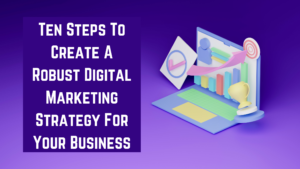Table of Contents
In today’s fast-paced, ever-evolving business landscape, one thing is clear: digital marketing is no longer an option, but a necessity. With the rapid digitization of almost every aspect of our lives, businesses that fail to leverage digital marketing are missing out on tremendous growth opportunities. In this blog, we’ll explore why digital marketing is of paramount importance in the modern business landscape.
“Good marketing makes the company look smart. Great marketing makes the customer feel smart.”
Joe Chernov

Importance of Digital Marketing for Business
1. Reach Your Target Audience Where They Are
The digital age has transformed the way people consume information and make purchasing decisions. Whether it’s searching for products or services, seeking recommendations, or conducting research, consumers turn to the internet. Through digital marketing, businesses can reach their target audience where they spend a significant portion of their time – online. This allows for more precise targeting and better engagement.
2. Cost-Effective Marketing Solutions
Compared to traditional advertising methods, digital marketing is often more cost-effective. Strategies like content marketing, email marketing, and social media marketing can provide a significant return on investment (ROI) without the hefty price tag associated with print, TV, or radio advertising. Even small businesses with limited budgets can compete effectively in the digital realm.
3. Data-Driven Decision Making
Digital marketing provides access to a wealth of data and analytics tools. Businesses can track and measure the performance of their marketing campaigns with great precision. This data-driven approach enables them to make informed decisions and continuously optimize their strategies. Whether it’s monitoring website traffic, click-through rates, or conversion rates, the ability to analyze data is invaluable.
4. Improved Targeting And Personalization
Digital marketing platforms allow businesses to collect and analyze data about their audience’s preferences and behaviors. This data can be used to create highly targeted and personalized marketing campaigns. Personalization not only enhances the customer experience but also increases the likelihood of conversions.
5. Enhanced Brand Visibility And Authority
In a crowded marketplace, digital marketing is the key to standing out. By creating quality content and optimizing it for search engines (SEO), businesses can improve their online visibility and credibility. Consistent, valuable content can position a business as an authority in its industry, which fosters trust among consumers.
6. Global Reach
One of the most significant advantages of digital marketing is the ability to reach a global audience. Regardless of the size of the business, digital marketing enables companies to expand beyond their local market and tap into new, potentially lucrative markets around the world. This level of reach was unimaginable with traditional marketing methods.

7. Real-Time Engagement
Digital marketing allows for real-time engagement with customers and prospects. Through social media, email, and live chat, businesses can interact directly with their audience, addressing questions, concerns, and feedback promptly. This real-time engagement builds stronger customer relationships and boosts brand loyalty.
8. Adapting To Changing Consumer Behaviours
As consumer behavior evolves, businesses must adapt. Digital marketing is agile and can quickly adjust to these shifts. It’s vital for staying relevant and competitive in a world where technology, trends, and consumer preferences change rapidly.
9. Measurable Results And ROI
One of the significant advantages of digital marketing is the ability to measure results accurately. Businesses can track the performance of their marketing campaigns and calculate their return on investment or ROI of digital marketing campaigns. This transparency is invaluable for making data-driven decisions and ensuring marketing efforts are effective.

In conclusion, digital marketing is the cornerstone of modern business success. It allows companies to connect with their target audience effectively, cost-efficiently, and with precise targeting. It empowers data-driven decision-making, enhances brand visibility, and adapts to evolving consumer behaviors. In today’s digital era, a strong digital marketing strategy is no longer a luxury but a vital component for growth and sustainability in the business landscape.





